News
January 2025
New name and mission:
Through academic research, education, and advocacy, the Journalism Initiative on Gender Peace and Security (JiG) upholds justice, equity, and rigor in reporting on a world in crisis.
Using a feminist lens, we deliver cutting-edge journalistic education for newsrooms and students, create curriculum, multi-lingual ethics tools for reporters on-the-go, and contribute gender-informed analysis of international peace and security, helping human rights defenders, journalists, students, and policymakers create lasting change.
Work strands:
1. Feminist Peace and Security -- Contributing feminist analysis of international peace, security, climate, migration and justice.
2. Gendered violence reporting -- Strengthening ethical reporting on gendered violence.
3. Newsrooms in crisis -- Advocating for press freedom, women and marginalized journalists facing job insecurity, intimidation, and threats.
November 2024
Rutgers Global, our home institution, highlighted the launch of our Arabic and Kurdish mini guide here.
Rutgers Sociologist and Associate Professor Zahra Ali outlines the ongoing controversy surrounding proposals to amend the Personal Status Code in Iraq, which would lower the age of legal marriage to nine. Ali describes what is at stake, and explains the social, historical and political context.
October 2024
Iraq - JiG was interviewed by Rudaw English, a media outlet in Iraqi Kurdistan about our work with SEED Foundation highlighting the need for ethical GBV reporting. Read more here.
Ukraine - Read this piece by Ukranian journalist Victoria Roshchyna, now confirmed dead in Russian custody, on her ordeal in 2022 when she was taken hostage on the way to cover the siege of Mariupol.
Lebanon - We join the Alternative Press Syndicate in calling for an independent investigation into the Israeli killing of journalist Issam Abdullah in Lebanon, and the wounding of journalists Christina, Dylan, Carmen, Elie, Maher and Thaer.
September 2024
SEED and the Journalism Initiative on GBV (JiG) Launch Pocket Guide for Media Practitioners on Ethical Engagement and Reporting on Survivors of GBV
September, 28 – Erbil, Iraq: Today, on World News Day, SEED Foundation and the Journalism Initiative on Gender-Based Violence (JiG), are proud to launch a new pocket guide designed to enhance ethical engagement and reporting on survivors of gender-based violence (GBV) and those at-risk. This essential tool is designed to support media practitioners, including journalists, photographers, and editors, reporting on women and GBV across Iraq, the Kurdistan Region, and beyond.
Download English, تحميل العربية, لێرەوە داونلۆدی بکە
Reporting on GBV is essential to raise awareness and advocate for change, but it must be done carefully to avoid exacerbating harm; requiring a balance between telling the story and safeguarding the dignity and safety of survivors.
With a high prevalence of GBV, including femicide, and “honor” killing in Iraq and Kurdistan, there is a critical need for the ethical treatment and representation of all women in the media. This is needed to prevent dangerous and stigmatizing coverage that may negatively impact public opinion, leading to dangerous rhetoric within the community, or encouraging further violence against women.
Women, in particular survivors of violence, should be treated with respect, have their safety and security treated as paramount, and be represented in a dignified manner by the media. In the lead up to the Kurdistan Region’s parliamentary elections, this must be a key priority, since violence against women candidates was prevalent during previous election cycles in both Iraq and the Kurdistan Region; notably online abuse and harassment.
This pocket guide aims to address knowledge gaps among media practitioners, particularly on issues related to obtaining informed consent and referrals to service providers when needed, and presents practical tools that aim to ensure their reporting does not endanger or re-traumatize survivors.
The partnership between SEED and JiG underscores a joint commitment to improving media practices around GBV, and a shared vision to promote responsible journalism that prioritizes the safety and well-being of survivors.
World News Day is a global initiative which aims to draw public attention to the role that journalists play in providing trustworthy news and information that serves citizens and democracy. Today, and everyday, SEED and JiG call for the media to take responsibility for the power of their words and actions.
The Pocket Guide is now available for media practitioners in Arabic, Kurdish Sorani, and English, and can be accessed on SEED and JiG’s websites. Pocket Guide for Media Practitioners – SEED Foundation – Kurdistan (seedkurdistan.org)
-ENDS-
This pocket guide reflects the core principles outlined in Silence and Omissions: A Media Guide for Covering Gender-Based Violence, published by the Center for Women’s Global Leadership at Rutgers University in 2021.
SEED Foundation is a local NGO in the Kurdistan Region of Iraq, committed to protecting, empowering, and supporting the recovery of survivors of violence and others at risk. Our approach to this mission is integrative and holistic. We provide quality and comprehensive services, including mental health and psychosocial support (MHPSS), legal, protection, and shelter services; training, capacity building, and education for those working to protect and serve survivors; and policy and advocacy to strengthen laws, policies, practices, and protections for vulnerable people, and to promote social change.
The Journalism Initiative on Gender-Based Violence works with independent journalists, media outlets and Schools of Journalism to strengthen reporting on gender-based violence, reduce its prevalence globally, and advocate for women journalists under threat — particularly those from marginalized communities, and those under attack for reporting on gender-based violence. The initiative is part of the Institute for Women’s Leadership at Rutgers, and Rutgers Global. Our website link https://gbvjournalism.org.
For media enquiries:
SEED Foundation – media@seedkurdistan.org
JiG – cathy.otten@rutgers.edu
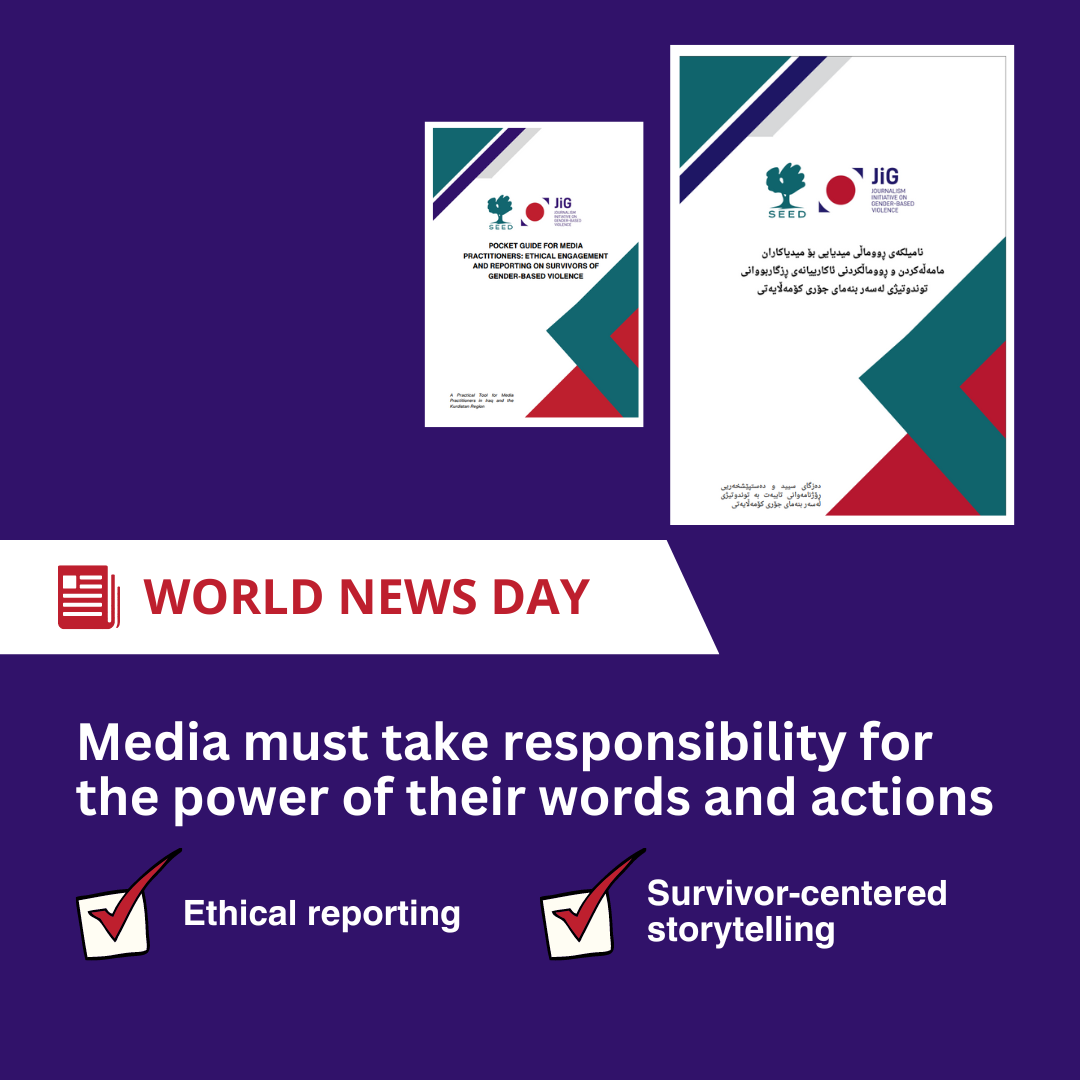
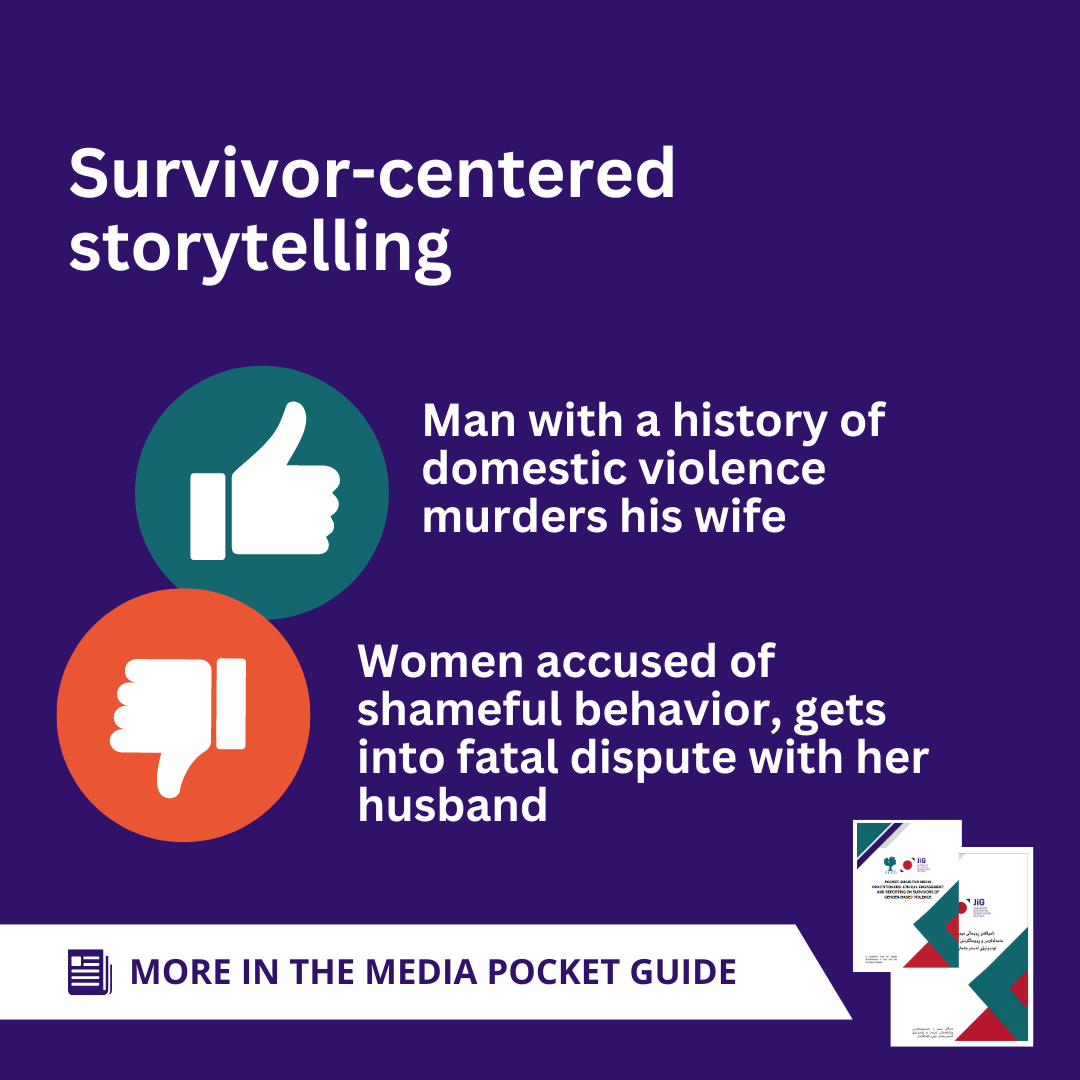
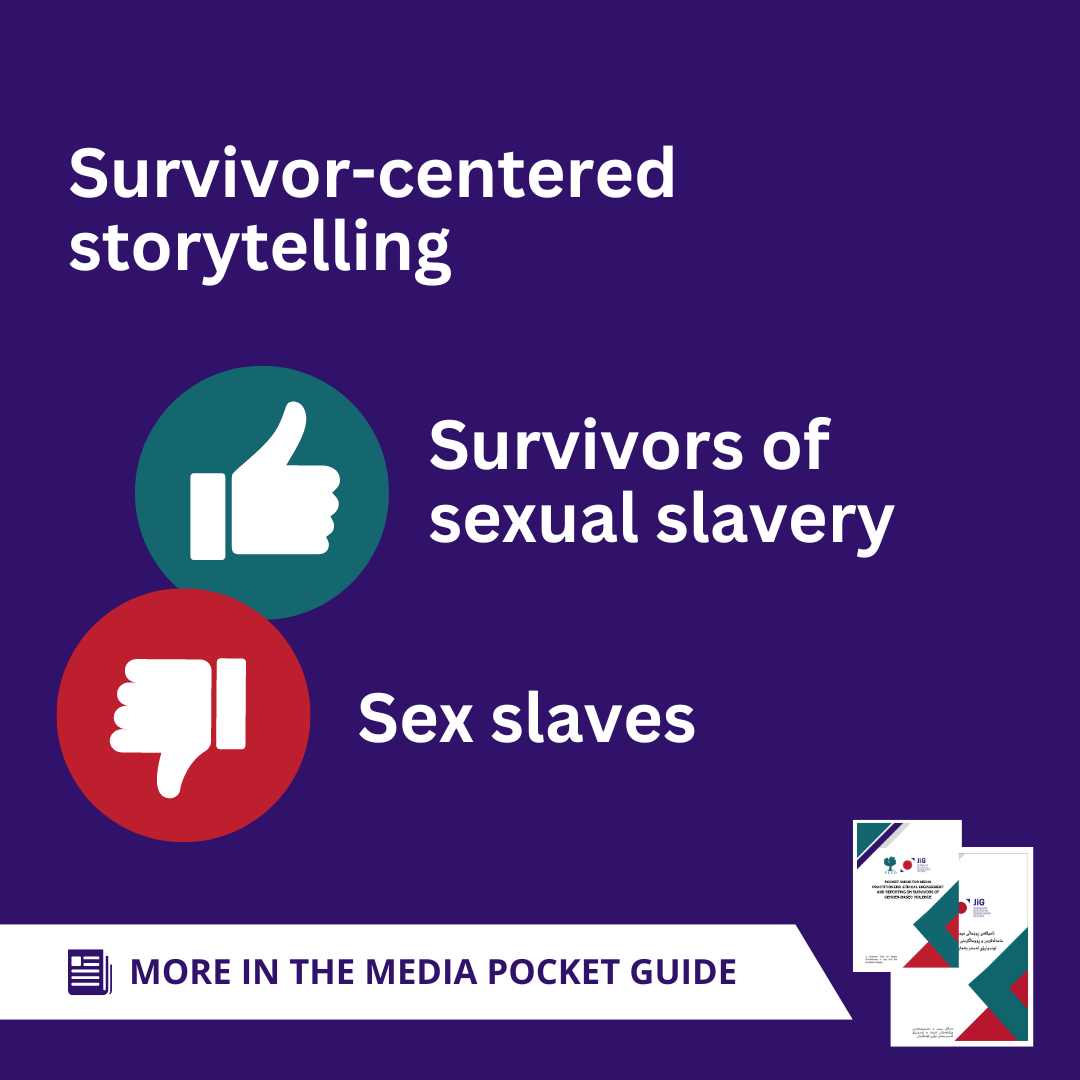
August 2024
Please find the new abridged French translation of Silence and Omissions (Chapters 1, 2 and 3). Translated by Françoise Vignon and edited by the book's author, Cosette Thompson.
Silence Et Omissions 1 2 and 3.pdf
July 2024
August 3 2024 marks 10 years since the start of the Yezidi genocide, committed by ISIS in Iraq. The Yezidi community will be under the media spotlight, particularly survivors of the attacks. Unethical reporting and interviewing has long been a problem and has led to the stigmitization of survivors, putting them at risk of further violence, and sharing identifiable information without their informed consent.
To encourage ethical reporting, our friends Yazda and Taboo LCC developed a short guide for the media, with reference to the lessons published in our book Silence and Omissions, with practical advice and requests on how to ethically engage with survivors and report on the genocide, with a list of accessible resources. Download the guide here.
May 2024
Our partners Media Advocacy Group in Nepal will host a JiG-sponsored multi-day training for LGBTQ journalists in Kathumandu, teaching basic journalism practices and lessons from our guide, Silence and Omissions.
April 2024
We joined 50+ journalism professors across the country calling for the New York Times to launch an independent investigation into ethical practices and failures behind its story 'Screams Without Words.' This will be vital to discover why mistakes were made and how they can be avoided in the future. Read more here.
March 2024
We signed this open letter from North American academics condemning the scholasticide in Gaza. Read here.
Our partners SEED Foundation carried out two consultations on Feb 13 and 16 with 38 media houses and journalists in Iraqi Kurdistan to gather views and thoughts on our co-written pact for ethical reporting and the protection of women journalists. Report coming soon.
Jan - Feb 2024
JiG's Cathy Otten joins the judging panel for the Solutions Journalism Network 2024 awards. The awards recognize, amplify and celebrate the best solutions journalism. Entries will be judged on the Solutions Journalism Network’s definition and four pillars of solutions journalism. In addition, entries will be judged on the basis of the U.S-based Society for Professional Journalists' Code of Ethics. Definition: Rigorous and compelling reporting about responses to social problems. Four Pillars: Features a response to the problem; contains evidence of the response’s impact, not just good intentions; includes insights - context that others can learn from; and discusses limitations to the response. Read more here.
Jan 24 - We delivered a Q&A session for Kurdish women trainee journalists in Iraqi Kurdistan with UNFPA and SEED on ethical reporting on survivors of gendered violence.
Feb 7 - We joined Worker Organization Global Program Manager Ardra Manasi and founder of Women Photograph Daniella Zalcman for a conversation on navigating sensitive topics, understanding biases and advancing inclusivity across all forms of media, using a global human rights lens.

- Feb 8 JiG lectured on gender and migration for journalism graduate students at New York University's Arthur L. Carter Journalism Institute.
- Feb 20 JiG lectured on gender and human rights for graduate Women, Gender, and Sexuality Studies students at Rutgers, the State University of New Jersey.
Oct-Dec 2023
- Tuesday 5 December. We joined a panel at University College London on advocacy reporting on gender-based violence. We spoke alongside Nimmi Gowrinathan, Founder and Director of the Politics of Sexual Violence Initiative and Visiting Research Professor at City College New York; New York Times Journalist Amanda Taub, and Kate Cronin Furman, Associate Professor in Human Rights at University College London.
- Monday 27 November. We delivered a lecture at New York University's Arthur L. Carter Journalism Institute on documenting and verifying sexual violence in active conflict settings. Our talk focused on answering the question: What are the accepted methods of verification in contexts where the implicated party is a state that can both aggressively deny, produce false evidence, or block investigations of sexual violence?
- JiG focused on campaigning against the ongoing killing of journalists in Gaza by the IDF. We condemn the murder of journalists across Israel, Palestine and Lebanon and call on governments with diplomatic power to compel Israel to immediately cease the targeting of journalists and their families, and to stop the shocking, daily killing of civilians in Gaza. We condemn the Hamas killings and holding of hostages. There are reports of sexual violence committed by Hamas fighters against Israeli civilians that need investigating. Survivors need respect, space, protection and care. Israel's gendered violence in Gaza, including obstetric violence, must end. Reports of torture and sexual violence used against Palestinians in Israeli prisons need investigation and further media attention. Members of the media should act with caution and understand how to undertake trauma-informed interviewing practices and use the survivor-centered approach, which can be found in the publication section of this website. Sexual violence by one belligerent should never be used as an excuse to carry out further attacks against civilians. Women and women's peace groups must be part of a negotiated peace settlement, and full human rights must be given to Palestinians. This is the only way to end gendered and non gendered violence for good.
- For Our Colleagues. We joined a coalition of 800+ journalists, media workers and organizations to demand an end to violence against the press in Gaza. Join the call here.
- Statement by journalists condemning the killing of journalists in Gaza. We joined Reporters Without Borders, the International Federation of Journalists and the Arab and Middle Eastern Journalists Association in demanding an explicit commitment from Israel to end the violence against journalists and other civilians.
- We join the International Journalism Federation in calling for the release of all imprisoned media workers and journalists in Iran, including Niloofar Hamedi and Elahe Mohammadi who were the first to report on Mahsa Amini's death in police custody.
- The Independent Commission of Inquiry on Ukraine released a report in October documenting further evidence that Russian authorities have committed indiscriminate attacks and the war crimes of torture, rape and other sexual violence, and deportation of children to the Russian Federation. Read the report here.
July - September 2023
- We initiated two academic projects: 1., a translation of the Silence and Omissions book, and 2., a collection of new academic and narrative nonfiction writing on crimes against humanity with Associate Professor Julie Rajan.
- The Rory Peck Trust has a new Therapy Fund for freelance journalists in need of psychological care. Link here.
- Women journalists face a dire situation in Afghanistan under the Taliban. We condemn the gender apartheid in Afghanistan, which amounts to a severe deprivation of rights faced by women and girls in every aspect of daily life. JiG supports the joint call to amend the draft crimes against humanity convention to encompass gender apartheid, with particular reference to the ongoing situation in Afghanistan. Read more here.
June 2023
- We released our yearly report for our funders at the Institute for Women's Leadership.
May 2023
- Following our February 5 journalism training course for 25 women journalists in Kathmandu, Nepal -- our partner organisation, the Media Advocacy Group (MAG) produced an in-depth report on the session. Read more here: MAG_JiG EVENT REPORT.pdfere.
- On March 21, JiG participated in a training session for journalists on reporting gender-based violence at the National Gender Committee office in UlaanBaatar, Mongolia. The session was run by Oyuntsetseg Jargalsaikhan from Mongolia's Press Institute.
- Journalist and Guardian North of England Correspondent, Robyn Vinter, wrote a brilliant report for the Guardian newspaper on May 10, 'Women should help design parks to tackle safety fears, says study,' highlighting the importance of women's safety in the public space, and the importance of including women in policy making decision making around outdoor spaces and leisure. Robyn participated in our February 2022 workshop & lecture at Oxford University's Reuters Institute, along with a class of journalist fellows from around the globe. Read her article here.
April 2023
- The Daily Targum, the official Rutgers student newspaper, published an article about our work, future plans and last month's public talk at School of Communication and Information.
The article, 'School of Communication and Information event discusses reporting on gender-based violence,' describes the reasons behind the Journalism Initiative on Gender-Based Violence's inception and details our ongoing work. Cosette Thompson, the author of the guide Silence and Omissions, told the Daily Targum that before the guide was published, "journalists expressed the need for concise, educational resources on gender-based violence, with many citing poor educational and professional experiences with reporting on the subject." Read the story in full here.
- The Daily Star Bangladesh, the country's leading English daily newspaper, published an opinion piece by Shuprova Tasneem, a member of our network and JiG workshop attendee. The story 'What is wrong with how we report on violence against women?' follows on from her Reuters Institute research paper analysing press coverage of gender-based violence in Bangladesh. Shuprova writes:
"While the 2020 anti-rape protests had momentum, print media did focus on the justice system, measures taken by law enforcement and government responsibility when reporting on rape. We need to continue this, as well as write on wider issues such as social stigma, health consequences of sexual violence, and the power structures that allow rape to be committed with impunity." Read more here.
February/March 2023
- JiG travelled to Kathmandu, Nepal to conduct a full-day workshop with 25 women journalists on gender-based violence reporting on February 5, along with our partner organisation in Nepal, the Media Action Group. Our co trainer was journalist Maiya Twayanabasu from BBC Nepal. During the trip, JiG was interviewed by a leading Nepali media organisation, and met with Asia Pacific representatives from press freedom organisation, Article 19.
- JiG's Senior Program Lead, Cathy Otten, began a series of guest lectures at Rutgers University on February 20. Cathy's talks offered Rutgers students guidance and expertise on International Media, Gender and Media, Writing about Social Issues, International Reporting and Graduate Pedagogy.
On February 21, Cathy gave a public talk at the School of Communication and Information, introducing the book Silence and Omissions to faculty, students and members of the public. The talk was hosted by the School of Communication and Information in collaboration with the Institute for Women's Leadership. Rutgers Ph.D. scholar Niki Natarajan led the discussion with members of the audience after the talk.
Cathy's talks, lectures, meetings, and office hours for students continued until Friday, March 3, and included presenting JiG's work to undergraduate and graduate school classes at the Institute for Women's Leadership, the Women and Gender Studies Department and the Journalism and Media Studies Department.
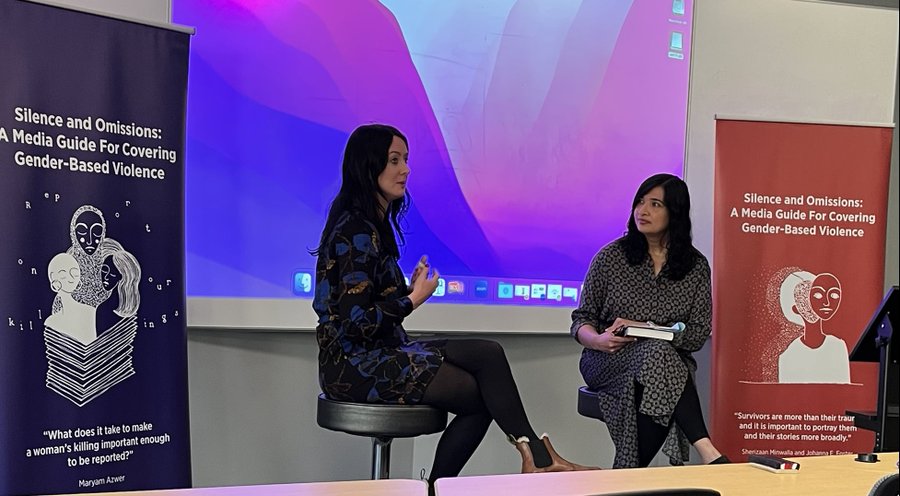
Image by Rutgers Distinguished Professor and Sociologist Mary Chayko. Source: https://twitter.com/MaryChayko/status/1628386615713468416
January 2023
- On January 30, JiG delivered an in-person lecture for students at the Asian School of Journalism in Chennai, India. JiG met with editor and Chennai Director of India's Press Institute, Sashi Nair, and was interviewed for a student journalist broadcast media project.
One student participant said: "I had heard about gender-based violence but never bothered to read about it. In a lecture for ACJ India, Cathy Otten made me curious and a bit furious as to why the issue isn't discussed as much. [I] was engrossed for every bit of those two hours."
December 2022
- JiG held its most recent meeting of the newly configured Advisory Board on December 14. The group features leading journalists, editors, social activists and third sector leaders from Asia, Latin America, Europe, Africa, Asia Pacific and the Middle East.
September 2022
- A new report from the Reuters Institute at the University of Oxford, 'Amid waves of protest, Bangladeshi media erased victims in 49% of reporting on sexual violence,' features guidance from the new JiG publication 'Silence and Omissions: A Media Guide for Covering Gender-Based Violence'. The report, written and researched by Bangladeshi journalist and Reuters Institute Fellow Shuprova Tasneem, asks the question: "What should journalists do if a country’s legal definition of sexual violence is in direct conflict with reporting that is centred on survivors and acknowledges their trauma?"
Shuprova Tasneem is a member of our network and was one of thirty participants to attend a JiG lecture/seminar at the Reuters Institute earlier this year. Shuprova interviewed JiG's director as part of her research.
Read her report here.
May 2022
- JiG signed an open letter condemning Médecins Sans Frontières for publishing exploitative and endangering images of children. The letter, organized by human rights and media ethics activists, followed the publication of photos identifying a child rape victim in the Democratic Republic of Congo taken by an MSF-contracted photographer. Following the action, the president of the charity issued an apology and vowed to strengthen reporting guidelines:
"Among the issues highlighted was our decision to publish identifiable photographs of a 16-year-old girl who was the victim of rape in Ituri, Democratic Republic of Congo. We acknowledge that the publication of these images was a mistake, and we are sorry. We have removed these images and other sensitive photographs from the online article and are taking a series of actions to put better safeguards in place.
This incident has revealed inadequacies in our guidelines on the gathering and use of images, and inconsistencies in how those are implemented across MSF. We are working to remedy this problem and are grateful to those who have raised it.
As an immediate action, we have added clearer language to our production guidelines to protect minors, defined as anyone under 18. The revised section requires that we change the name and obscure the visual identity of minors who are victims of abuse, exploitation, or who are suffering from a highly stigmatised condition. The rules impose additional restrictions on any content featuring minors. They also clarify that minors cannot provide informed consent on their own."
- On May 5, JiG participated in a training workshop for journalists and press officers in Ulaanbaatar, Mongolia. We introduced key concepts from our handbook 'Silence and Omissions: A Media Guide for Covering Gender-Based Violence' alongside trainer and manager Oyuntsetseg from Mongolia's Press Institute, in partnership with the National Gender Equality Secretariat.
Photographs of the participating journalists reproduced with permission from the National Committee on Gender Equality:
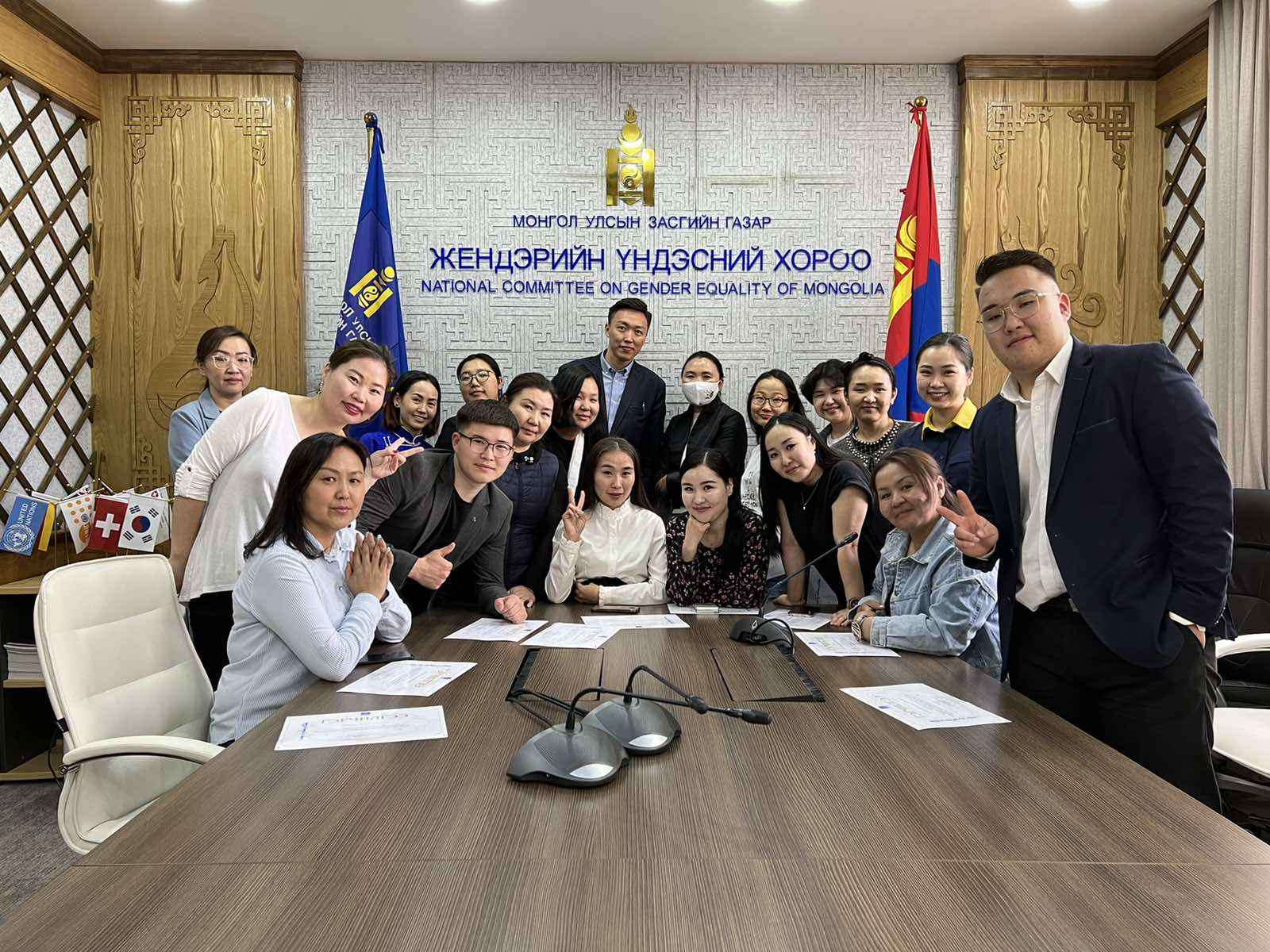
- JiG published two promotional videos, and two flyers to mark the publication of our reporting guide. All are available to download and use below:
Silence and Omissions Promotional Video Gradient.mp4
Silence and Omissions Promotional Video Purple.mp4
Silence and Omissions Twitter advert:
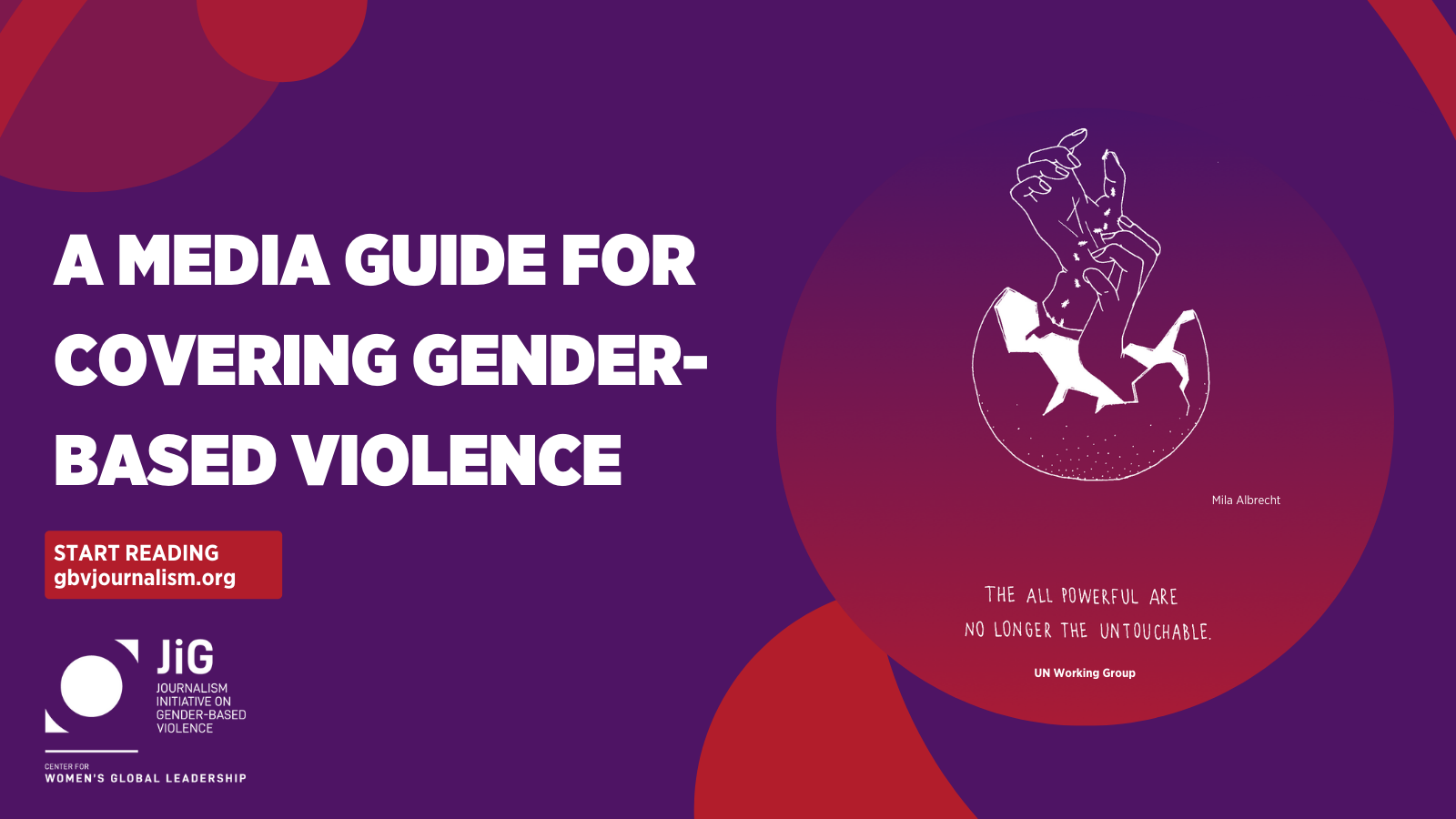
Silence and Omissions Instagram advert:
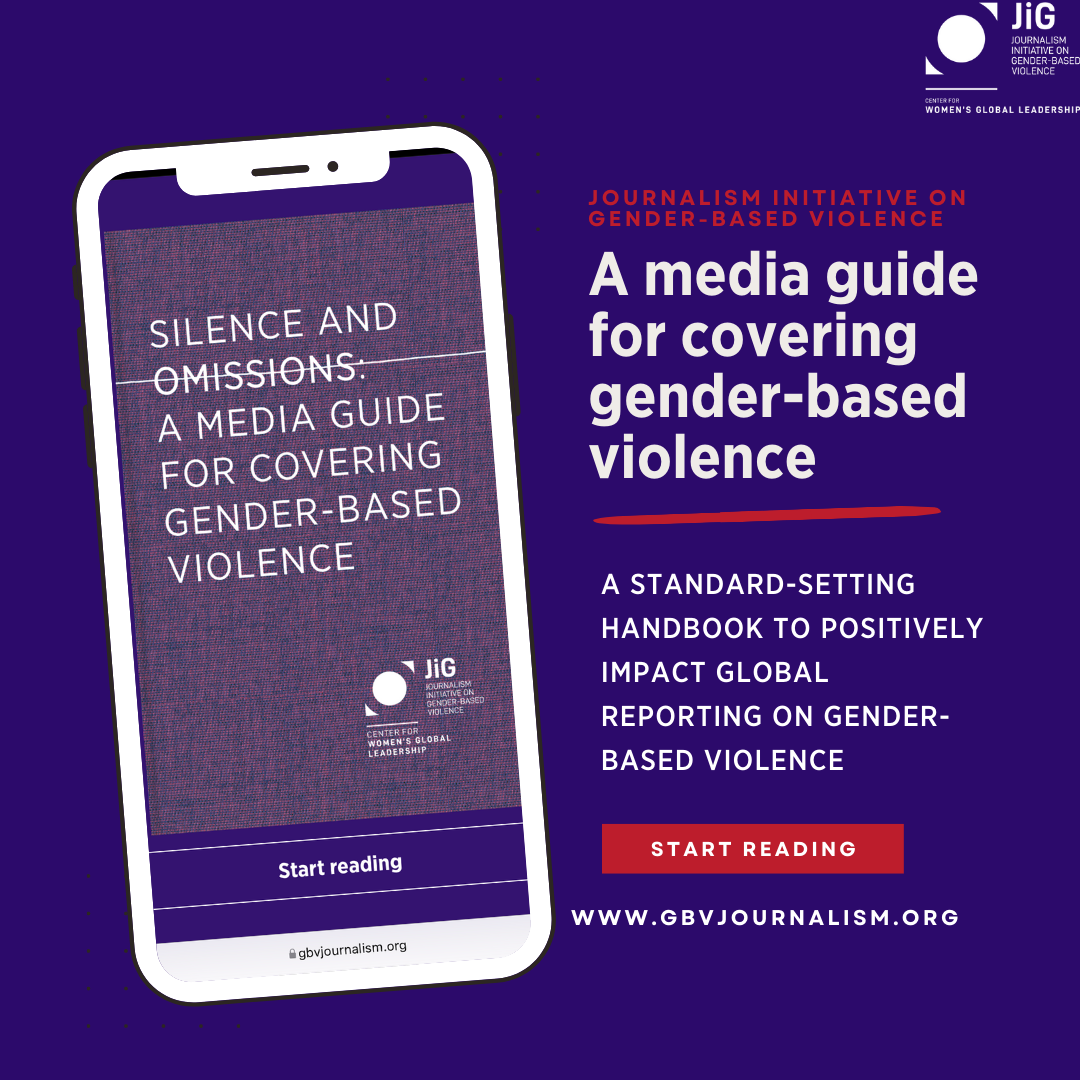
April 2022
- To mark the National Week of Action to end the crisis of Missing and Murdered Indigenous Women and Girls [MMIWG], JiG is publishing a new short guide for journalists reporting on MMIWG:
War on Indigenous Women A Short Guide for Journalists Reporting on MMIWG.pdf
The guide was written in collaboration with the National Indigenous Women's Resource Center, and journalists Alice Driver, Suzette Brewer, Brandi Morin, Chantal Flores, Jane Gerster, Diana Washington Valdez, and Rana Husseini.
March 2022
- On International Women's Day this year, we launched our new guide book 'Silence and Omissions: A Media Guide for Covering Gender-Based Violence' in Kenya. We heard from ten journalists and advocates, primarily from Kenya, about the work that still needs to be done to eliminate bias from reports on gender-based violence and sexual harassment. Kenyan journalist and guidebook contributor Eunice Kilonzo moderated the event with insight and style.
- The Journalism Initiative on Gender-Based Violence (JiG) hosted an online panel discussion ‘Reporting on Gender-Based Violence in a Heating World’ on March 16 during the Commission on the Status of Women session in New York. Leading journalists and experts from India, Bangladesh, Fiji, Samoa, and Malawi described how climate change is exacerbating gender-based violence in their regions, and how as journalists we can better educate the public about the ongoing crisis.
February 2022
- The Journalism Initiative on Gender-Based Violence’s Senior Program Lead, Cathy Otten, addressed this year’s class of global journalism fellows from thirty different countries at Oxford University’s Reuters Institute on February 3rd. Cathy introduced key ideas from CWGL’s new standard-setting guide ‘Silence and Omissions: A Media Guide for Covering Gender-Based Violence’, and led a lively debate on ethics when reporting on gender-based violence, and the need for gender sensitivity in newsrooms.
- On February 22nd, Cathy delivered a lecture on feminist media advocacy to a class of graduate students from the Department of Women's and Gender Studies and Rutgers, the State University of New Jersey, followed by a discussion on writing techniques and how to structure an article.
December 2021
- CWGL published its new, standard-setting reporting manual ‘Silence and Omissions: A Media Guide for Covering Gender-Based Violence,’ in December, following consultations with more than 100 journalists and photographers from 38 countries. The book outlines a survivor-centered, human rights-based approach to reporting, and directs journalists toward producing more insightful, impactful coverage of gender-based violence. Book contributors give helpful tips on writing about some of the most pressing topics of the day, such as femicide, intimate partner violence, reproductive rights, and sexual harassment.
- On December 6, the Journalism Initiative on Gender-Based Violence and the National Indigenous Women’s Resource Center hosted a webinar: ‘Crimes of Power: Reporting on Femicide’. Expert journalists and advocates from Canada, the U.S., U.K., Mexico, and Jordan described their experiences reporting on femicide and missing and murdered Indigenous women and girls. The webinar is now available to watch online here. We were joined by journalists Alice Driver, Suzette Brewer, Brandi Morin, Chantal Flores, Jane Gerster, Diana Washington Valdez, Rana Husseini, and Mallory Adamski from the NIWRC.
For more information on the crisis of missing murdered Indigenous women and girls in the U.S. and Canada, visit the National Indigenous Women’s Resource Center’s website.
- JiG's Senior Program Lead Cathy Otten addressed an online panel hosted by Equality Bahamas, along with the head of the Digital Department at Eyewitness news Ava Turnquest; Emmy-winning director, producer, and correspondent for PBS Newshour Daffodil Altan; and feminist, research consultant and writer Alicia Wallace. Cathy described the new guidebook, the survivor-centered approach to reporting on gender-based violence, and the difficulty of keeping ethical standards high while working in sometimes hostile newsrooms.
November 2021
- This month JiG published a new tip sheet for reporters covering online violence. The tip sheet 'Reporting on Digital Violence: A practical reference guide for journalists and media' was developed by JiG in partnership with UNFPA, the United Nations sexual and reproductive health agency.
https://www.unfpa.org/resources/digital-violence-tip-sheet-for-journalists